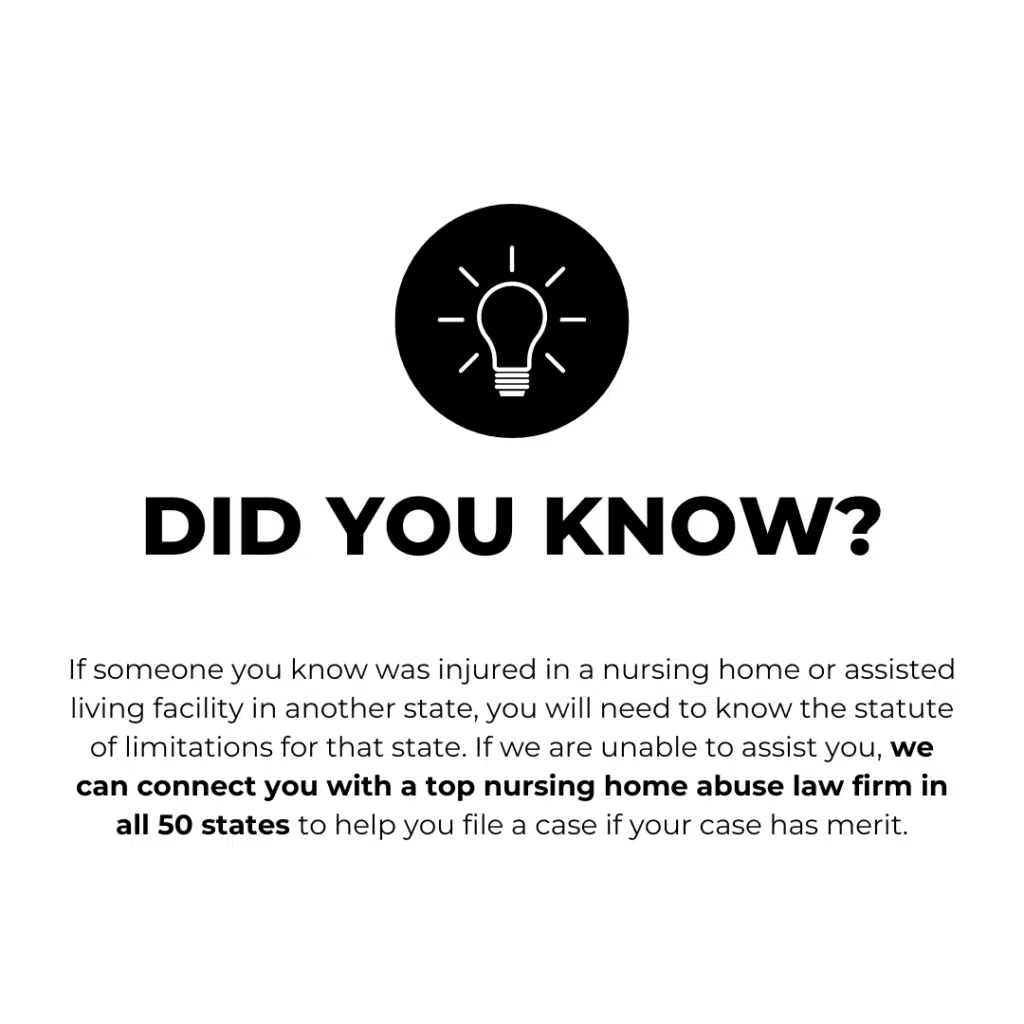
Nursing home abuse and neglect put vulnerable residents at serious risk, leading to malnutrition, dehydration, infections, and preventable injuries. When facilities fail to provide adequate care, residents suffer, and families are left feeling helpless. Lack of supervision, improper medical treatment, and unsafe conditions can result in devastating harm. Understanding the warning signs, knowing your legal rights, and holding negligent facilities accountable are crucial steps in protecting your loved ones. Learn how to take action and seek justice.
November 6, 2024
3 min
Nursing home abuse is sadly very common, affecting many older adults. According to the World Health Organization, about one out of every six people over 60 has experienced some form of abuse or neglect in the past year.
However, the true extent of the problem may be even more alarming. A study by the U.S. Department of Health and Human Services found that nearly 25% of cases of nursing home abuse go unreported. This means that a significant number of abuse incidents remain hidden, making the actual number much higher than what’s officially recorded.
These unreported cases not only conceal the true scope of the issue but also deny victims the help and support they need. We need to raise awareness about nursing home abuse, improve reporting methods, and ensure that those who experience abuse receive the necessary assistance and protection.
Abuse in nursing homes is a serious problem that often stays hidden. There are many reasons why residents may be hesitant to report abuse to proper authorities. One reason is that loved ones may not know what signs to look for. Another reason is that residents might be scared that the nursing home will retaliate against them for reporting abuse. Sometimes, they feel ashamed or embarrassed about what’s happening to them and become reluctant to report the abuse. There might also not be enough staff to monitor residents and have the time to detect abuse. Understanding these reasons is crucial for finding ways to better protect nursing home residents and ensure they receive the care and support they deserve.
Recognizing abuse in nursing homes can be challenging, as it often escapes notice, even by those directly affected. Many family members and loved ones of nursing home residents may not be familiar with the signs of abuse. This can lead them to overlook potential indicators. Nursing home staff may fail to identify abuse due to misconceptions that symptoms are simply a result of aging or existing medical conditions like dementia or Alzheimer’s disease.
By increasing understanding of these signs and promoting open communication, we can better protect these individuals from abuse and ensure they receive the support they need. Possible signs of nursing home abuse may include broken bones, unexplained weight loss, scrapes and bruises, and social isolation.
Understaffing in nursing homes can also create a stressful environment for the existing staff. This can lead to burnout. When workers are overburdened with tasks and responsibilities, they may be less attentive to signs of abuse or neglect. Burnout can also make it more difficult for abuse to be noticed by other staff members. They may become overwhelmed and take their stress out on residents. Addressing staffing shortages is essential not only for ensuring resident safety but also for supporting the well-being of nursing home staff and maintaining quality care standards.
Nursing home residents might worry that if they speak up about abuse, the people in charge will treat them even worse. They may fear that others will not believe them or think they’re just imagining things. This can be especially true for residents who have cognitive issues such as PTSD, Alzheimer’s disease, or dementia.
Nursing home staff who get angry when residents report abuse might punish them in different ways. Staff may cancel social activities that residents look forward to or refuse to help with important things like bathing or eating. Some might even physically or verbally hurt the residents, take away their rights, or try to isolate them from other people. Residents may refrain from reporting abuse for fear that they will no longer have assistance with their basic needs.
Because they can’t defend themselves or leave easily, residents often feel stuck and do not speak up about the abuse. They worry about what might happen if they do. This fear isn’t just for the residents—some staff members might be scared to report abuse because they’re afraid of losing their jobs or being treated badly at work. Both residents and staff must hold those responsible by reporting them to the necessary authorities.
All these fears and worries can make it extremely difficult for people in nursing homes to live without feeling scared or helpless. Everyone needs to understand these issues and work together to make sure residents are safe and well cared for.
Feelings of shame or humiliation often prevent abused nursing home residents from speaking out about their experiences. They may feel embarrassed that they couldn’t stop the abuse or protect themselves. The shame from abuse can lead to hesitancy in discussing what happened. These emotions are common among abuse victims who may blame themselves for the mistreatment they endured.
Residents may fear judgment or disbelief from others if they disclose their abuse. They may worry about how their families, friends, or even nursing home staff will react. These worries can further contribute to their reluctance to come forward. The fear of not being believed or being seen as weak can intensify feelings of shame and embarrassment.
In the unfortunate event that a resident experiences abuse at their facility, it’s crucial to ensure they know how to report it. For emergencies or immediate danger, dialing 911 is the fastest way to get help. In cases of suspected abuse, contacting the police is recommended. These individuals are mandated reporters, meaning they are required by law to report any suspected abuse.
It is important to document any incidents of abuse and gather as much information as possible to support your report. This may include dates, times, names of involved parties, and descriptions of what occurred. By taking proactive steps and advocating for your loved one’s safety, you can help ensure that any instances of abuse are addressed promptly and effectively.

When you suspect that a loved one in a nursing home is being abused, it’s natural to feel strong emotions. However, it’s important to handle the situation calmly and methodically. By staying composed, collecting information, and reaching out for help from the right sources, you can address elder abuse productively.
Here are some steps to follow if you suspect abuse:
Providing training for nursing home staff on recognizing and responding to abuse is essential. This includes teaching them how to identify signs of abuse, fostering a culture of reporting, and ensuring that all allegations are taken seriously and investigated thoroughly.
Implementing regular inspections can help identify potential issues early on and prevent abuse from occurring in the first place. By holding nursing homes accountable for maintaining safe and respectful environments, we can better protect vulnerable residents from harm.
It’s also important to empower residents and their families to speak up and advocate for their rights. Providing them with clear instructions for reporting abuse and ensuring their concerns are addressed promptly can help create a supportive system for their loved ones.
Ending nursing home abuse requires a lot of effort from the community – including government agencies, healthcare providers, advocacy organizations, and society at large. Together, we can work towards creating a society where every individual, regardless of age or ability, is treated with compassion, respect, and dignity.
Disclaimer: This information is provided for informational purposes only. Nothing in this article should be construed as providing legal advice or the creation of an attorney client relationship. Laws are updated frequently and change from state to state. If you desire legal advice, you can contact Michael Hill Trial Law at www.protectseniors.com, send an email to info@protectseniors.com, or call (800) 659-2712 to begin an investigation or contact another attorney.